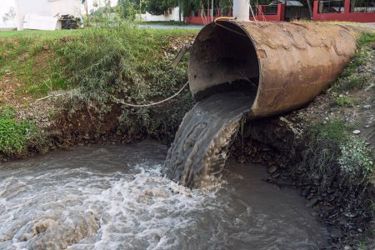UCS Study Uncovers Tyson Foods' Massive Pollution Footprint

A new study shows Tyson Foods, the second-largest meat processing company in the U.S., dumped more than 371 million pounds of pollutants into U.S. waterways during a five-year period between 2018 and 2022. According to the Union of Concerned Scientists (UCS), contaminants were present in approximately 87 billion gallons of wastewater that was dumped directly into natural water sources commonly used for drinking water, fishing, farming, and recreation.
The UCS report indicates that Tyson wastewater included various amounts of nitrogen, phosphorus, chloride, oil, and cyanide, in addition to blood, bacteria, and animal feces. The data is collected from 41 Tyson slaughterhouses and food processing plants, which is just one-third of the total number of wastewater-producing operations the company has in the U.S., and represents just 2% of the total national total.
Slaughterhouses are one of the top emitters of phosphorus, which can cause algal blooms that can deplete oxygen levels in aquatic ecosystems, asphyxiating fish and causing serious health issues for humans who live near or rely on such water systems.
Much of the pollution from Tyson and other meat processing corporations is concentrated in the Midwest, which communities are already struggling with high levels of phosphorus and nitrates stemming from industrial agricultural operations. Tyson pollution in Nebraska alone included 4.06 million pounds of nitrate, a chemical that can cause blood disorders and neural defects in infants, and cause cancer and thyroid disease in adults. Research has identified possible associations between high levels of nitrates in waterways and elevated incidence of pediatric cancer.
Under the U.S. Clean Water Act, the U.S. EPA regulates wastewater discharge from meat processing plants and slaughterhouses into nearby lakes and streams, but the rules apply to just 300 of the more than 7,000 sites in the U.S. The EPA is currently considering updating these rules for the first time in 20 years following a 2017 lawsuit from environmental groups. However, the rule is not expected to be finalized until 2025, and experts worry that the final rules will not be strong enough.
Tyson and its industry peers are fighting hard to ensure that. The meat processing industry spent more than $4.3 million on lobbying in Washington in 2023, half of which came from Tyson. The industry has also made more than $6.6 million in campaign donations since 2020.
“Poor environmental regulation is down to the stranglehold industrial agriculture has on politics – at every level,” said George Cunningham, a retired aquatic ecologist and Missouri River expert at Sierra Club Nebraska. “It’s about political capture.”
